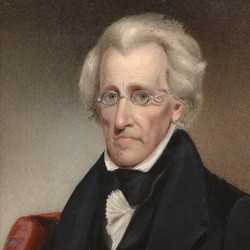Now with links to Library of Congress manuscript facsimiles
Andrew Jackson was born near the border of the colonial Carolinas and would take part in many of the early republic’s signal events, but he came to define a new era in American history and left the presidency forever changed.
Orphaned at the age of fourteen in the wake of the American Revolution, this son of Irish immigrants parlayed a rural law practice into a place in Tennessee politics, representing the state in both the U.S. Congress and Senate and serving on its supreme court. It was his ensuing military career, however--including victory over the British at the Battle of New Orleans and such aggressive execution of the First Seminole War that it resulted, in part, in Spain’s ceding Florida to the United States--that brought Jackson to national attention and set in motion the "Old Hickory" legend. Jackson was elected as the first Democratic president in 1828.
From the beginning, he stamped the highest office with his wildly individualistic character. Jackson feuded bitterly with rivals such as John Quincy Adams and Henry Clay and even with his own cabinet members (inspiring the creation of an informal set of advisers, the "Kitchen" Cabinet). He reformed what he considered a stagnant government, and yet he allowed the spoils system into Washington; and while his veto of a new charter for the National Bank effectively ended that institution, he believed staunchly in the union and clashed with his own vice president, John C. Calhoun, to enforce federal tariffs in the South. Jackson championed the common man, but he remains a contentious figure in human rights. As both a slave owner and the signer of the Indian Removal Act, he was intimately connected to two of our nation’s greatest abominations. He encompasses America’s contradictions unlike any other president.
This XML-based archive collects Jackson’s papers in one powerful online resource. It is fully annotated and searchable, and as part of Rotunda’s American Founding Era collection it is interoperable with digital editions covering the most important personages of the nation’s early history.
Thanks to collaboration between Rotunda and the staff of the Papers of Andrew Jackson at the University of Tennessee, Knoxville, volumes 7–11 of our edition include direct links from over 1400 citations to manuscript facsimiles of the cited document in several Library of Congress collections, including Jackson, Martin Van Buren, Polk, Lincoln, Gideon Welles and many others.
